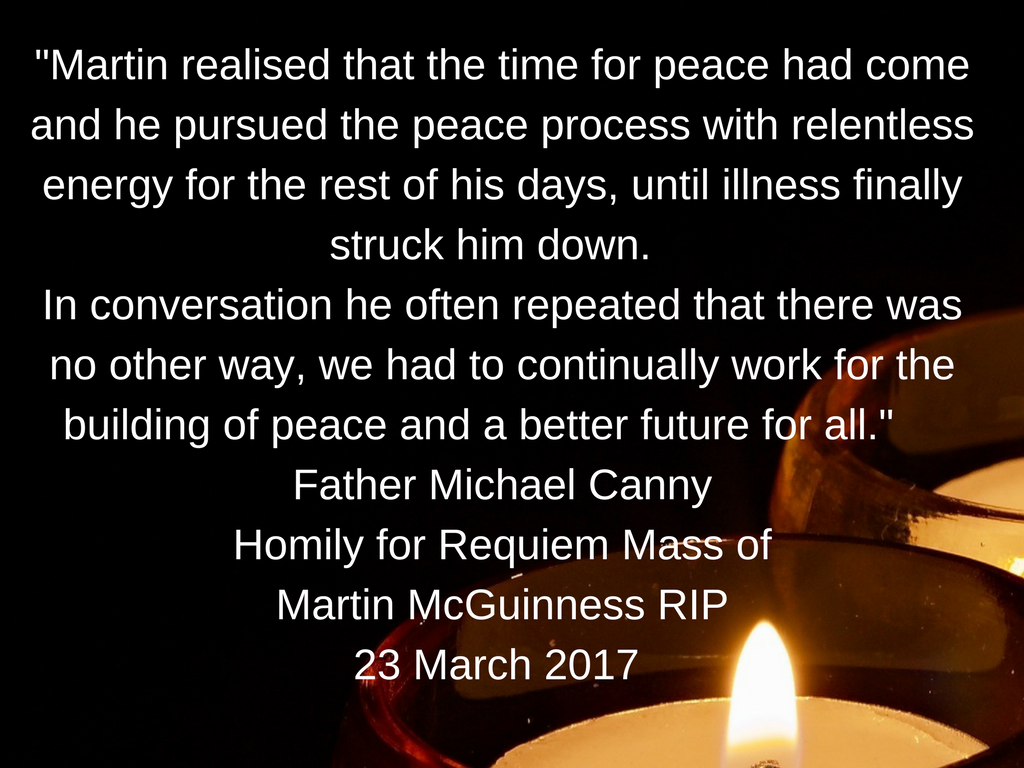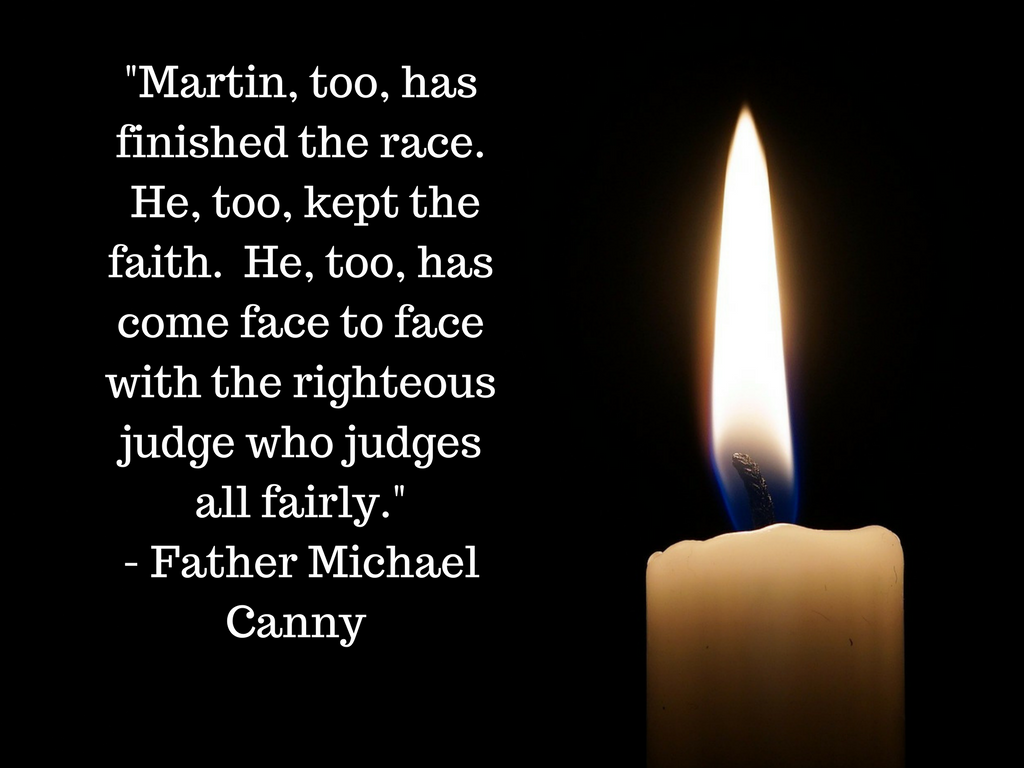Earlier this afternoon Father Michael Canny, Parish Priest of Glendermott and Strathfoyle, received the remains of Martin McGuinness at the main entrance of Saint Columba’s Church, Long Tower, Derry. Father Canny was joined by Bishop Donal McKeown, Bishop of Derry to welcome distinguished visitors, family, and the congregation to the funeral Mass.
A special message from Archbishop Eamon Martin, Archbishop of Armagh and Primate of All Ireland was read to the congregation by Father Canny:
“I bring condolences from Archbishop Eamon Martin, Archbishop of Armagh and Primate of All Ireland, who is unable to join us this afternoon. Archbishop Eamon, who visited Derry yesterday to pay his respects at Martin’s family home, has offered his Mass in Armagh this morning for the repose of Martin’s soul. He has asked me to extend once again his sympathy to Bernie and to all Martin’s family, loved ones, friends and party colleagues.”
Bishop Donal McKeown presided at the Mass and Father Michael Canny was principal celebrant and homilist. They were joined by clergy from within and from outside the Diocese of Derry. Clergy from other Christian denominations were also present.
The chief mourners were the wife of Martin McGuinness, Mrs Bernadette (Bernie) McGuinness, their children Grainne, Fionnuala, Fiachra and Emmet and their Grandchildren.
In his homily Father Canny said, “If any of you have ever visited Saint Paul’s Cathedral in London, you may have seen the plaque on the wall of the crypt where the man who designed the church – the celebrated architect Sir Christopher Wren – is buried. There is an inscription on it, in Latin, which is usually translated as: “Reader, if you seek his monument – look around you.”
“Well, if you seek Martin McGuinness’s monument, his legacy – look around you. Look not at the beauty of this Saint Columba’s Church, which was such an integral and important part of Martin’s life. Look, instead, at the people gathered in this church, to say farewell to a man who was such a proud member of this community, the person who came to be a widely respected leader of this community, someone who has been acknowledged in recent days as a politician who spent year after year moving this community towards peace.”
Father Canny went on to say, “There are people in this church today whose presence would have been unthinkable only a generation ago. They have forged working relationships with Martin McGuinness; they have built friendships with him; they have occupied Stormont’s benches alongside him. Some have even sat in government with him. You are all very, very welcome. The presence of those political rivals and opponents among you, who have come to pay their respects this afternoon, is the most eloquent testimony to the memory of Martin McGuinness. When you seek his monument, you – by your presence – are his monument.”
Father Canny said that many column inches have been written and myriads spoken about Martin McGuinness in recent days and that his life and death have been retold in innumerable television and radio interviews.
Father Canny said, “Martin was a complex man. He was born into a community where faith, Catholicism and Nationalism were intertwined. He was a man of simple tastes who ascended to the political summit. He visited the White House, Downing Street and Windsor Castle, but only ever felt at home in his beloved Bogside, returning to his wife and family at every opportunity. He shook hands with presidents, prime ministers, Taoisigh and even royalty, but was most comfortable walking with Bernie along the backshore at Buncrana, or wandering at Inch Island or up at Grianan, or along a river bank fishing. He ate many formal dinners but was happiest when eating cabbage and bacon, or a piece of salmon caught by his friend James Quinn. Martin the Sinn Féin leader who first shared power, then became friends, with the late Dr Ian Paisley; Martin was the IRA commander who became a mainstay of the peace process.”
Remembering his last recorded interview on RTÉ, part of which was broadcast on Tuesday morning, during which Martin McGuinness was asked about the judgement of history, Father Canny said, “He wasn’t worried about what historians thought, he told Tommie Gorman; he said he would leave it to the judgement of people. He asked only that he be judged fairly.”
Father Canny said that he has had many conversations with Martin McGuinness down through the years and that Martin knew only too well how many people struggled with his IRA past. He said, “Republicans were not blameless, and many people right across the community find it difficult to forgive and impossible to forget.”
Father Canny continued, “During this past month, Lord Trimble wrote to Martin telling him that he had been indispensable in bringing about devolution after the signing of the Good Friday Agreement. Former First Minister Arlene Foster said on Tuesday that Martin’s contribution to the political and peace process had been “significant” and had “helped build the relative peace we now enjoy”, and yesterday in the assembly chamber said “I doubt that we will ever see his like again”. In January, as the seriousness of Martin’s illness was becoming more and more obvious, Ian Paisley Jnr. thanked him, saying his “remarkable journey” had “not only saved lives but made the lives of countless people better”.
“The word ‘journey’ has been used by many people in recent days to describe Martin’s transition from man of war to man of peace. The word journey is also used frequently to describe the believer as he or she lives life on the way to union with God.”
Father Canny said, “In our Gospel we heard of the disciples’ journey that began in darkness after the death of Jesus – having witnessed his crucifixion – but turned to hope when they discovered that he was not dead but alive.
“By any standards, Martin McGuinness was a remarkable man and his life was a remarkable journey. The values he had, the principles he championed are still very much alive.
“The first reading tells us that on that journey there is a time for different things:
‘A time to love, and a time to hate;
a time for war, and a time for peace.’
 “On that journey many years ago, Martin realised that the time for peace had come and he pursued the peace process with relentless energy for the rest of his days, until illness finally struck him down. In the course of that journey he encountered many obstacles but he remained resolute. In conversation he often repeated that there was no other way, we had to continually work for the building of peace and a better future for all. Despite many setbacks he never became disheartened.”
“On that journey many years ago, Martin realised that the time for peace had come and he pursued the peace process with relentless energy for the rest of his days, until illness finally struck him down. In the course of that journey he encountered many obstacles but he remained resolute. In conversation he often repeated that there was no other way, we had to continually work for the building of peace and a better future for all. Despite many setbacks he never became disheartened.”
Father Canny concluded his homily by focusing on the faith of Martin McGuinness. He said, “We come here to this church this afternoon because Martin was also a man of faith. He believed in God and his faith was important to him. Prayer was very important to him. In Saint’s Paul’s second letter to Timothy, read in our second reading, the apostle said the time of his departure had come and he prepared to face the Lord, “the righteous judge”. He had finished the race. He had kept the faith.
“Martin, too, has finished the race. He, too, kept the faith. He, too, has come face to face with the righteous judge who judges all fairly.”
Father Canny concluded his homily by offering words of comfort and condolence to the family. He said, “In a short time we will lay Martin to rest and we will all go our different ways to continue with the bits and pieces of life but Bernie, for you and the family, life has been changed. Yes, it will continue, but it will be very different – no more waiting for the car to come across the street with the knowing that he was home safe. A big figure has been taken from your life and the life of your family, but be assured of our prayers and continuing support over the many difficult and challenging days ahead.”
The choir for today’s Mass was Cór Cúl Aodha under the direction of Peadar Ó Riada. All of the pieces they sang were in the Irish language including Lúthgháireach Padraig (Críost liom), Is é an Tiarna m’aoire (The Lord is my Shepherd) Psalm 23, and Ag Críost an Síol. The Communion hymn was Bothar na Síochána (The Road of Peace), written by Dónal Ó Liatháin with music by Peadar Ó Riada.
Readings at today’s Mass were read by family members including Odhran Mc Guinness, a nephew of Martin McGuinness, who read from the book of Ecclesiastes (Ecclesiastes 3:1-8); and Mr Sean Hargan, a son-in-law of Martin McGuinness, who read from the second letter of Saint Paul to Timothy (2 Timothy 4:6-8).
The Prayers of the Faithful were read by the grandchildren of Martin McGuinness: Tiarnan Hargan, Rossa Devine, Oisin Hargan, and Ciana Devine; and by Rev Harold Good and Rev David Latimer.
At the conclusion of the Requiem Mass, the remains of Martin McGuinness were taken to the City Cemetery for burial.
ENDS


